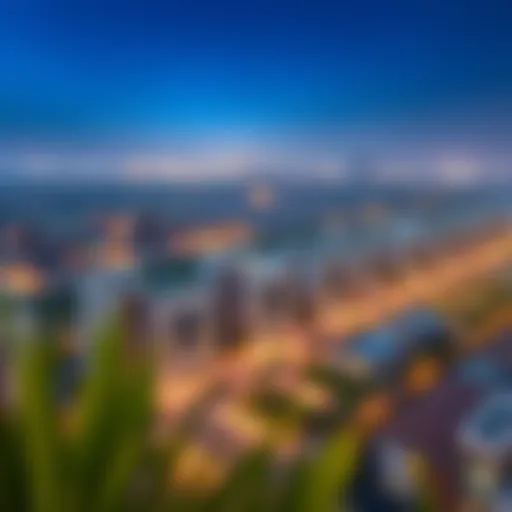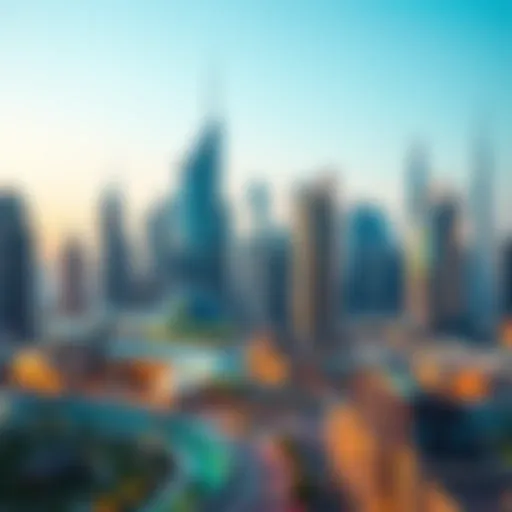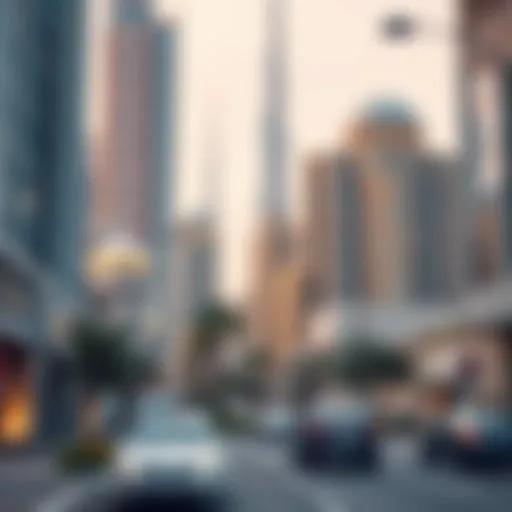Eid al-Fitr Celebrations in Dubai 2023: A Deep Dive
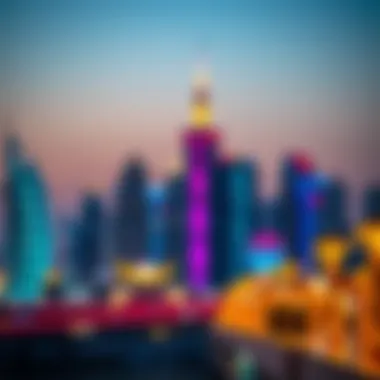
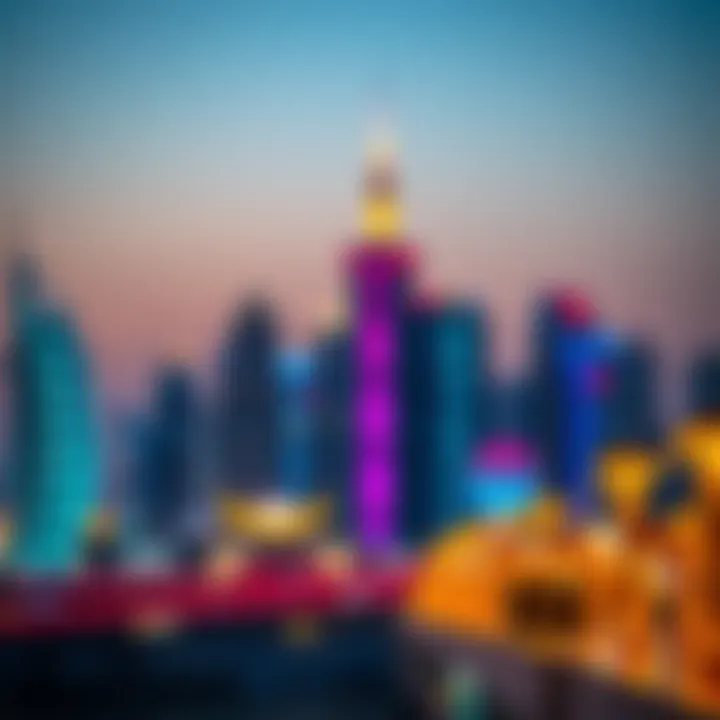
Intro
Eid al-Fitr, a festival marking the end of Ramadan, holds a special place in the hearts of many Muslims around the world. In Dubai, this occasion is far more than just a religious observance; it transforms the bustling city into a vibrant spectacle of culture, community, and celebration. As we dive into the happenings of 2023, it’s essential to grasp how this festival not only strengthens social bonds but also influences economic dynamics, particularly within the real estate sector.
Celebrations in Dubai revolve around deep-rooted traditions enriched with contemporary flair. This year, families filled their homes with warmth and laughter, inviting friends and neighbors to share in the joy. The sights of beautifully decorated streets and public spaces highlighted the significance of togetherness and compassion. Special prayers filled the mosques, showcasing the unity among diverse nationalities residing in the city.
However, the impact of Eid al-Fitr extends beyond cultural celebrations. One cannot ignore the accompanying economic vibrancy during this festival. For investors, real estate agents, and buyers, understanding the fluctuations in property values and market trends during this period can be enlightening. The communal spirit fosters numerous events, enhancing the allure of various neighborhoods and potentially attracting new residents or investors, making it a prime opportunity to grasp the pulse of property dynamics in Dubai.
In the sections to follow, we will explore key insights concerning the market trends observed during this period and tips for potential buyers looking to invest in this dynamic hub. The unique combination of tradition and commerce that shapes Eid al-Fitr in Dubai makes it an opportune time for stakeholders to assess the evolving landscape.
Intro to Eid al-Fitr
Eid al-Fitr marks a significant moment in the Islamic calendar, representing the end of Ramadan, a month dedicated to fasting, prayer, and reflection. Celebrating this festival in a cosmopolitan city like Dubai adds layers of cultural richness and community spirit that are both unique and profound. In this section, we delve into the historical significance of Eid and the religious observances associated with it, providing a foundation for understanding how these elements play a pivotal role in shaping celebrations in 2023.
Historical Significance of Eid
The roots of Eid al-Fitr stretch back to the time of Prophet Muhammad. It's not merely a holiday; it's a celebration that symbolizes the collective achievement of spiritual growth and discipline during Ramadan. Historically speaking, Eid originated from the teachings of Islam. After a month-long fast, the festival serves as a time for gratitude, reflection, and communal harmony.
It's fascinating to note that different cultures have adapted their ways of celebrating Eid while still maintaining respect for its core principles. For instance, in some regions, people visit mosques, while in others, community feasts are the highlight of the celebrations. The essence of Eid lies in connection, not just to God but also to one another. It fosters unity among diverse demographics, making Eid an integral aspect of Islamic heritage.
Religious Observances
Coming together for Eid al-Fitr involves not only joy and festivity but also important religious observances. The day typically begins with a special prayer, known as Salat al-Eid, which is held at mosques and open fields. This prayer is a demonstration of solidarity, as men, women, and children gather in a show of faith and community.
On the morning of Eid, it is customary for Muslims to perform specific rituals, including:
- Giving Zakat al-Fitr: This is a charitable donation made to the less fortunate, ensuring that everyone can partake in the celebrations. It's a beautiful illustration of sharing and generosity.
- Festive Meals: Families prepare special dishes, often traditional ones that might not be made throughout the year. It’s a way of commemorating the end of fasting and enjoying time together.
- Visiting Loved Ones: The significance of family during Eid cannot be overstated. Visiting relatives and friends is a cherished part of the observance, reinforcing bonds and community ties.
In essence, Eid al-Fitr transcends mere festivities; it’s a time for spiritual rejuvenation, showcasing compassionate values that resonate across diverse populations. As we shift our focus toward the celebrations in Dubai, the intersection of cultural influences and religious observance provides a fascinating lens to explore.
Eid al-Fitr in the Context of Dubai
Dubai, a city that represents a stunning blend of tradition and modernity, showcases the profound significance of Eid al-Fitr in its cultural landscape. This festive occasion, marking the end of Ramadan, is not just a religious celebration; it's a community event that resonates through the streets of Dubai where diverse cultures converge. For investors and stakeholders, understanding this context is paramount, as it affects various sectors from hospitality to retail and real estate.
Eid al-Fitr in Dubai serves as a vibrant reminder of the city's ability to embrace different traditions while forging a unique identity. As people flock to the city from all corners of the globe, Dubai becomes a tapestry of vibrant customs, food, and celebrations, reflecting the ethos of a melting pot society.
Cultural Melting Pot
The essence of Dubai lies in its multicultural society. During Eid, this diversity shines brighter than a diamond on a sunny day. Different cultures celebrate Eid with their own distinctive flair. For instance, you might encounter traditional Emirati songs alongside South Asian folk dances or Turkish delights sharing a plate with Arabic sweet treats. This cultural plurality offers unique business opportunities in the Dubai property market, as both expatriates and locals search for venues to celebrate their festive occasions.
Moreover, events like kite festivals, arts and crafts fairs, or open-air cinemas during Eid create avenues for local businesses to flourish. Investors might consider these events not merely as celebrations but as platforms for potential growth in various sectors, including construction, hospitality, and entertainment.
Impact on Local Communities
Eid al-Fitr’s impact goes beyond mere celebrations; it's a nurturing force for community bonding and social cohesion in Dubai. It presents a rare opportunity for community members to come together, regardless of their backgrounds. Families take part in communal prayers and host iftar meals, where the spirit of sharing and generosity permeates the atmosphere.
For local economies, this communal gathering can be a boon. Local shops see a surge in business due to increased foot traffic as people purchase gifts, sweets, and clothing in preparation for the festivities. Real estate developers might notice a rise in demand for residential properties that are conducive to hosting families and guests during Eid, emphasizing the importance of understanding consumer behavior in the property market.
Moreover, community-led initiatives aim to support those less fortunate, bringing forth the essence of compassion that Eid stands for. Volunteering opportunities arise, allowing people to give back, showcasing the city's inclination towards social responsibility. As real estate investors and developers analyze the local climate, they must recognize that sustaining relationships within the community can yield long-term benefits.
"Eid al-Fitr is not just a day of festivity; it's a celebration of community and cultural richness in the heart of Dubai."
In summary, Eid al-Fitr in Dubai is a multifaceted celebration that strengthens community ties and showcases the city’s rich cultural fabric. Understanding the subtleties of this festive period is crucial for stakeholders in the property sector, offering insights into market trends and consumer preferences that can influence strategic decisions. This dynamic interplay between culture and business paves the way for new opportunities while reinforcing the spirit of unity during this significant occasion.
Events and Celebrations
Eid al-Fitr in Dubai is not just a holiday; it is a vibrant tapestry of events and celebrations that showcase the rich cultural heritage and communal spirit of the city. The importance of this section lies in its ability to highlight how these festivities stimulate the local economy while also nurturing a sense of belonging among residents and visitors alike. During this period, Dubai transforms into a hub of joy, filled with activities that cater to diverse segments of society, including families, tourists, and young professionals.
The celebrations serve multiple purposes: they reinforce social bonds, enrich cultural identity and bolster local businesses. Essentially, they provide a unique insight into how traditions can harmoniously coexist with modernization, a subject of great significance for stakeholders in the property market.
City-wide Festivities
Dubai never does things halfway, and Eid al-Fitr is no exception. The city-wide festivities unfold like a beautifully choreographed dance, with various events taking place across different neighborhoods. From the bustling Al Seef to the iconic Dubai Mall, the entire metropolis comes alive.
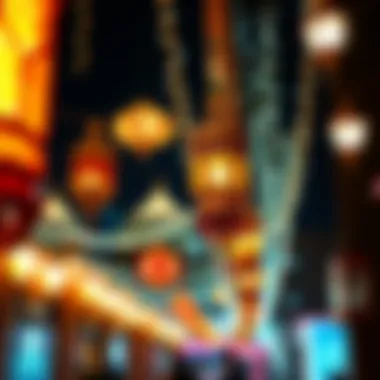
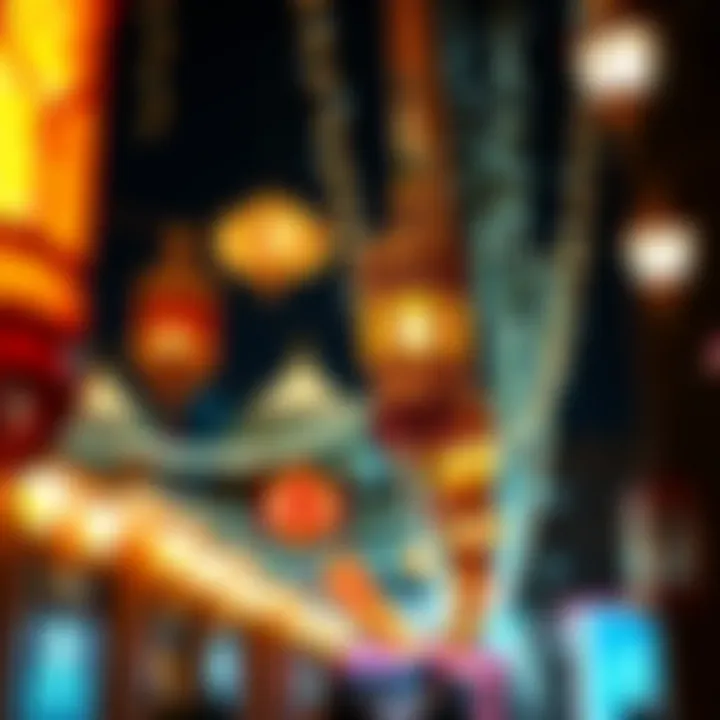
One can find extravagant fireworks displays lighting up the sky, an annual tradition that draws crowds in droves. Additionally, public parks are transformed into venues for concerts and cultural performances, showcasing local artists and international talent. Local authorities often organize parades that feature beautiful floats, traditional dances, and musical performances, all aiming to reflect Dubai's multicultural ethos.
Moreover, there's no shortage of free family entertainment — from interactive workshops to children's play areas filled with engaging activities. As visitors explore these festivities, they not only enjoy the vibrant atmosphere but also contribute to local economies, further stimulating growth during this festive period.
Family-Oriented Activities
The essence of Eid revolves around family, and Dubai takes this sentiment seriously. Neighborhood communities come together to host family-oriented activities, ensuring that every member of the family has something to partake in. Parks, malls, and community centers become hotspots for fun-filled events.
Parents can take their children to art and craft stations set up by local artists, where kids can express their creativity. Similarly, storytelling sessions that delve into the cultural significance of Eid engage young hearts and minds.
Furthermore, many establishments offer special Eid theme nights, where families can enjoy entertainment tailored for them. Bouncing castles and stage performances meant purely for younger audiences create a lively and child-friendly ambiance, driving home the point that Eid is genuinely for everyone.
Culinary Experiences
No celebration is complete without the food, and Eid al-Fitr in Dubai is a feast for the senses. The culinary experiences during this festive period are as diverse as the population itself. Restaurants and hotels showcase special Eid menus, pulling dishes from around the globe — a true reflection of Dubai’s status as a culinary melting pot.
From traditional Arabic mezze to international delights, visitors can indulge their taste buds in ways that only Dubai can offer. Spice-scented eateries prepare lavish Iftar buffets, while street vendors tantalize passersby with sweets like baklava and kunafa.
Moreover, many families take the opportunity to host lavish meals, inviting friends and relatives to share joyous moments over delectable spreads. Some families even go the extra mile, participating in community-sponsored meals aimed at supporting those less fortunate.
Key Takeaway: The events and celebrations during Eid al-Fitr in Dubai function not only as a joyous gathering for families and communities but also play a critical role in boosting local economies. As people come together to celebrate, they strengthen social ties and revive the spirit of giving, an essential tenet of the holiday.
In summary, the events surrounding Eid al-Fitr in Dubai are multifaceted, engaging an array of people from various backgrounds. The city becomes a microcosm of festive spirit, enriching both its cultural landscape while informing potential investors about the social dynamics at play.
Economic Considerations
In examining the broader context of Eid al-Fitr celebrations in Dubai, the economic implications emerge as a significant theme. The festival not only serves as a time for spiritual reflection and community engagement, but it also has profound effects on various sectors of the economy. A thorough understanding of these economic considerations helps investors, developers, and market watchers appreciate the multifaceted nature of the festivities.
Tourism and Hospitality Trends
Eid al-Fitr represents a peak time for tourism in Dubai, driven by both local residents and international visitors eager to partake in the celebrations.
- Increased Accommodation Bookings: Hotels often report a spike in bookings during Eid, as families gather and visitors flock to experience the vibrant culture. This rise in demand can lead to increased rates, with some hotels fully booked months in advance.
- Cultural Tourism Factors: Visitors are captivated by the cultural programs organized around the holiday. Events like concerts, fireworks, and traditional performances draw crowds. This influx enriches the city’s hospitality sector, benefiting restaurant operations and leisure activities.
The hospitality industry thus capitalizes on Eid, creating packages that highlight local attractions, like the Burj Khalifa and the Dubai Mall, in conjunction with special Eid events.
Retail Sector Performance
The retail environment undergoes a remarkable transformation during Eid. The association of the holiday with shopping sprees makes this period particularly lucrative. Retailers see a marked uptick in consumer spending, with many businesses launching special promotions to attract festive shoppers.
- Propensity to Buy Gifts: Eid al-Fitr encourages the exchange of gifts among family and friends, resulting in increased sales of fashion, electronics, and traditional memorabilia. As such, retailers prepare campaigns leading to various sales events that coincide with the celebrations.
- Luxury Market Gains: High-end brands benefit significantly as well; luxury goods become often sought-after gifts, reinforcing the image of Dubai as a shopping haven. Seasoned investors know to look for clues about market trends surrounding Eid to strategize inventory and sales approaches.
The cumulative effect of these factors highlights a thriving retail sector that thrives on consumer enthusiasm and cultural engagement.
"Eid al-Fitr is not just a religious observance. It is a phenomenon that fuels the economy – a catalyst for growth in multiple sectors."
Evaluating the economic impact of Eid al-Fitr in Dubai offers crucial insights for stakeholders. Informed decisions can follow from recognizing how festivals influence both tourism and retail dynamics. As such, as we continue to explore the landscape of Dubai during Eid, the deep link between culture and economy deserves careful attention.
Eid al-Fitr and Real Estate Dynamics
Eid al-Fitr isn’t just a time for celebrations in Dubai; it also plays a crucial role in the dynamics of the real estate market. Understanding how this festive period affects various sectors, particularly real estate, can provide valuable insights for investors, real estate agents, and developers. The significance of Eid stretches beyond the joyous gatherings and feasting; it brings about certain trends and behaviors that can influence property transactions and market performance.
Seasonal Property Market Trends
The property market often reflects the seasonal changes, and Eid al-Fitr is no exception. During this festive period, various factors come into play that can lead to a noticeable shift in market activity.
- Increased Demand for Rentals: Many people choose to celebrate Eid with their families and friends, which often results in a spike in demand for short-term rentals. This includes hotel stays, serviced apartments, and holiday homes on platforms like Airbnb. Families traveling to Dubai for the occasion often prefer more spacious accommodations that can host gatherings, thus enhancing the appeal of sizable apartments and villas.
- Sales Velocity: With festive promotions and incentives from developers, buyers become more inclined to invest in properties during this season. Real estate firms sometimes roll out new launches and special offers timed around this festive occasion to capitalize on the increased footfall in real estate showrooms.
- Neighborhood Popularity: Certain areas, renowned for their proximity to prayer places, community festivities, or markets, may see an uptick in interest. For instance, communities like Downtown Dubai or Deira may appeal to those looking for vibrant surroundings to celebrate, pushing local property values upward.
- Price Adjustments: As the market becomes more buoyant during Eid, property prices may experience fluctuations. Sellers could be more optimistic, leading to increased asking prices. However, this can be a double-edged sword, as buyers may be looking for good deals, creating a more competitive atmosphere.
Investor Behavior During Festivals
Investors' behaviors during Eid al-Fitr can also shift dramatically, illustrating how festivities influence decision-making processes.
- Investment Approach: Many investors are more likely to explore strategic acquisitions during the holidays, focusing not only on immediate gains but also on long-term opportunities, especially with family-oriented properties. It’s common for investors to feel a surge of enthusiasm during festive times, prompting them to act more decisively.
- Focus on Community-Oriented Developments: An increasing number of investors are now looking towards projects that promote community living and social interaction. Properties that offer facilities for family gatherings or that are located near cultural hubs are particularly appealing during this time.
- Impulsive Purchases: Whileiness is not typical for most investors, Eid can foster a more emotional and spontaneous buying decision. The celebration ignites feelings of joy and togetherness, which can sway investors to overlook certain analytical elements when making deals, especially if they're purchasing for personal use or second homes.
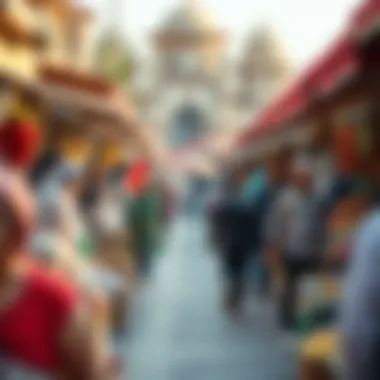
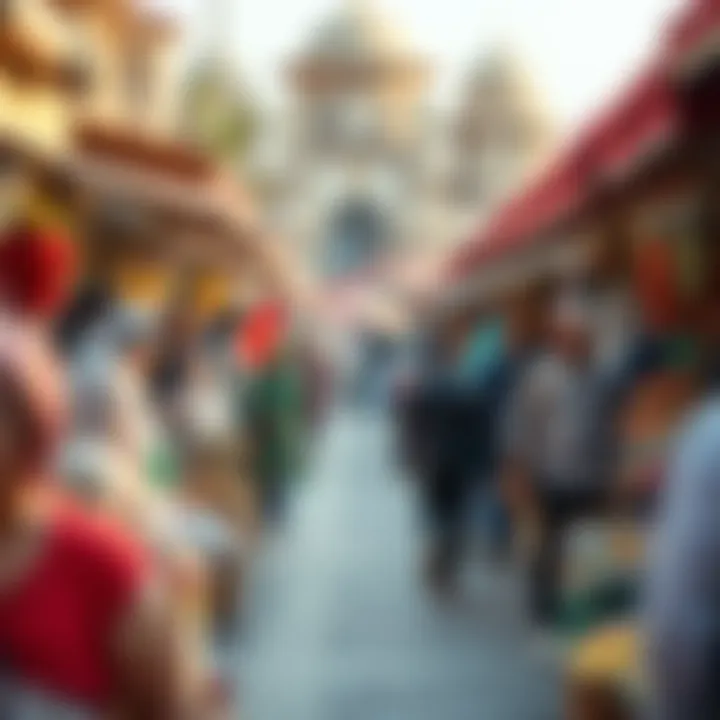
"The festive spirit can often blur the lines between calculated real estate investments and personal desires, resulting in a unique marketplace dynamic."
- Networking Opportunities: Eid gatherings serve not only as a time for celebration but also as a platform for networking. Investors may find themselves in conversations that lead to potential collaborations, partnerships, and even joint ventures while attending community events or family gatherings.
In essence, Eid al-Fitr is a significant period for real estate in Dubai. The interplay between cultural festivities and the property market provides a fertile ground for understanding how investors and buyers make decisions. Navigating this landscape strategically can lead to fruitful opportunities and profitable ventures.
Social Media and Public Engagement
The rise of social media has reshaped the way celebrations are experienced and shared, especially during significant events like Eid al-Fitr. In a city as diverse and bustling as Dubai, social media acts as a powerful platform for individuals and communities to connect, engage, and celebrate together. It transcends borders and bridges cultural gaps, making real-time sharing and participation more accessible than ever.
Social media provides a rich tapestry where people can document their unique traditions and practices related to Eid. Instagram, Facebook, and Twitter are not just platforms for users to express their personal narratives, but they have also become vibrant channels for communal celebration. The colors, sounds, and emotions of Eid can be captured and broadcast to a global audience, inviting interaction and engagement.
Additionally, these platforms nurture a sense of belonging among expatriates and locals alike. Individuals can bond over experiences, participate in online challenges, and contribute to broader conversations about what Eid means to them. This participation fosters a sense of community that can enhance the festive spirit.
Key Benefits of Social Media Engagement During Eid:
- Global Connectivity: Allows individuals from different cultural backgrounds to share their practices.
- Real-time Interaction: Participants can engage instantly, making them feel part of a larger celebration.
- Marketing Opportunities: Businesses can leverage these platforms to promote services and products that resonate with the festive atmosphere.
- Documenting Traditions: Users can preserve and share unique aspects of their family’s or community’s celebrations.
As we dive deeper into the specific ways social media enhances public engagement, it’s crucial to acknowledge the effectiveness of online celebrations.
Online Celebrations
In 2023, online celebrations of Eid al-Fitr have transformed the way festivities are conducted. Virtual events provide a marvelous alternative for families who are geographically distanced. These gatherings can take the shape of live-streamed prayers, video call instances where families can share meals and connect, or virtual cultural performances that showcase traditional music and dance.
With the click of a button, thousands can gather virtually in one room to share their joys, thoughts, or even their culinary delights. Notably, many organizations, religious institutions, and community groups orchestrate online programs that include live dialogues, spiritual discussions, and entertainment, all aimed at enhancing the feeling of closeness and mutual respect among participants.
Social media platforms might organize contests and hashtags that encourage users to post photos and videos, showcasing their Eid preparations, which can create a sense of excitement and anticipation for the festivities ahead.
Advantages of Embracing Online Celebrations:
- Inclusivity: Everyone can join, regardless of location.
- Adaptability: Easily accommodating those unable to attend in-person events, such as individuals with physical limitations or health concerns.
- Cost-Effective: Reduces travel and venue costs while still fostering connectivity.
Influencer Marketing During Eid
In an era where influencers wield significant sway over consumer behavior, their role during Eid al-Fitr celebrations cannot be underestimated. Marketers have embraced this trend, using influencer campaigns to amplify message reach. Brands that cater to products related to Eid often collaborate with influencers to craft genuine content that resonates with audiences.
These influencers share festive advice on how to celebrate Eid, tips on gift purchasing or meal preparations, and how to enrich the experience with family traditions. They not only spread awareness about products and services but also serve to connect with the audience on a personal level, making the promotional content feel less commercial and more relatable.
Critical Considerations for Influencer Marketing:
- Authenticity: Influencers should share genuine experiences; audiences can sniff out inauthenticity from a mile away.
- Cultural Sensitivity: Respecting traditions is key; campaigns should celebrate diversity without being superficial.
- Community Engagement: Encourage influencers to interact with followers, turning the focus from promotion to creating meaningful connections.
Ultimately, as Eid continues to evolve in the context of Dubai, the impact of social media and influencer marketing will grow, weaving new threads into the fabric of communal celebrations.
Government Initiatives and Support
As Dubai rises to meet the diverse expectations of its inhabitants and visitors, government initiatives play a vital role in shaping the Eid al-Fitr experience. These initiatives transcend mere logistical assistance, melding cultural significance with the economic impact on the city. By providing resources and guidance, the authorities ensure that the festivities resonate with both tradition and modernity, appealing to an array of demographics from the locals to international tourists.
Public Celebrations Funded by Authorities
Public celebrations during Eid al-Fitr are vivid displays of community spirit and government backing. Authorities invest significantly to orchestrate events that blend entertainment, cultural exhibitions, and spiritual gatherings, creating an inclusive environment.
- Fireworks Displays: Iconic firework shows illuminate the skies across various locations such as Dubai Marina and Al Wasl Road, drawing crowds eager to witness the spectacle. Not only are these displays visually stunning, but they also serve to unify people of various backgrounds in a shared experience, reinforcing the festive spirit.
- Cultural Activities: Events showcasing traditional music, dance, and art are often part and parcel of public celebrations. These provide valuable platforms for local artists and performers, enabling them to present their heritage to a broad audience. The Dubai Culture and Arts Authority often partners with local communities to ensure authenticity in these representations.
- Food Festivals: The government plays a crucial role in facilitating food festivals where visitors can indulge in diverse culinary traditions. From Middle Eastern specialties to global cuisines, these events cater to the gastronomic interests of all attendees, simultaneously stimulating local businesses.
This financial and logistical backing from authorities not only enhances the festive atmosphere but also underscores a commitment to fostering communal ties and supporting local businesses.
Regulatory Framework for Events
Every well-orchestrated celebration is grounded in a robust regulatory framework that governs event organization. This framework is essential for several reasons, particularly during large-scale events like Eid al-Fitr festivities in Dubai.
- Safety Regulations: Ensuring public safety is paramount. Local authorities work diligently to establish safety protocols that encompass everything from crowd control to health measures. During Eid celebrations, police and emergency services are deployed strategically to maintain order and promptly address any incidents.
- Permitting Processes: Organizers of festivities typically must navigate a thorough permitting process. This includes securing necessary approvals from relevant government entities, which helps to regulate the types of activities allowed and ensures compliance with local laws.
- Encouragement for Local Participation: The framework often encourages local businesses and community organizations to partake in celebrations, reflecting the city's diversity. Local vendors are supported through regulations that allow them to set up stalls during festivals, promoting entrepreneurship and community engagement.
The regulatory framework, thus, not only safeguards attendees but also promotes community involvement and ensures that events capture the essence of Eid al-Fitr celebrations.
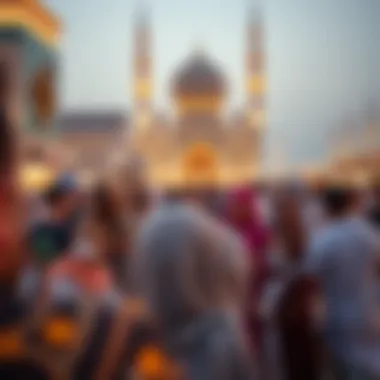

"Successful celebrations are not just about the events themselves but also how well they are managed and supported by authority measures."
Through these government initiatives and structured regulations, Dubai successfully cultivates a rich tapestry of cultural and economic interactions during Eid al-Fitr, further solidifying its position as a world-leading city in celebrating diversity and unity.
Cultural Representation
Cultural representation plays a significant role in reflecting the rich, multifaceted identities and traditions that shape the celebration of Eid al-Fitr in Dubai. This celebration is not just a religious observance; it is an intricate tapestry woven from various cultural threads. It showcases how communities come together, embracing both shared values and individual identities within the larger Islamic framework.
As Dubai continues to evolve as a global city, the cultural representation observed during Eid al-Fitr becomes even more important. It stresses the importance of integrating diverse voices and experiences, allowing both locals and expatriates to celebrate their traditions while fostering mutual respect and understanding.
The celebrations take many forms. The overlap of art, literature, gastronomy, and performance create a rich environment where creativity thrives and stories unfold. The various forms of cultural expression during Eid serve not just as a conduit for joy but as a platform for dialogue among communities.
"Art often serves as a mirror reflecting the times we live in, and during Eid, it captures the vibrancy of our shared experiences."
Art and Literature Celebrating Eid
Art and literature have long been a means of preserving cultural identity and history, making them integral to the Eid al-Fitr festivities. In 2023, Dubai saw a plethora of creative expressions highlighting the festival. This included visual artworks, poetry, and storytelling events, showcasing the festival's essence.
Local artists gathered to exhibit their works, often inspired by traditional themes of unity, forgiveness, and renewal, common during Eid celebrations. Community murals sprang up in various neighborhoods, creating vibrant public spaces where passersby could connect with the spirit of the holiday. This expression doesn't just beautify the city; it also raises awareness of cultural narratives that often go unheard amidst the hustle and bustle of urban life.
In literary circles, poetry readings and book releases focused on the themes of Eid resonated with readers. These gatherings provided a venue for authors to share their perspectives, further enriching the cultural fabric of the community.
Cultural Exhibitions and Festivals
Cultural exhibitions and festivals during Eid al-Fitr present a splendid opportunity to showcase the artistic talents within Dubai, as well as to promote cultural exchange. 2023 was no different, as the city hosted events that celebrated both local and international traditions associated with Eid.
From traditional bazaars to interactive workshops, the rich array of activities drew participants from various backgrounds, reflecting Dubai's status as a melting pot of cultures. These events featured:
- Craft stalls selling handmade artifacts often tied to Eid traditions.
- Culinary festivals where local chefs prepared dishes that reveal the flavors of Muslim culture.
- Live performances from musicians and dancers, highlighting both traditional and contemporary styles.
Notably, the organization of these events often involved collaboration between local authorities and community groups, making them a testament to Dubai's commitment to fostering an inclusive environment. Such initiatives enable attendees not only to celebrate but also to engage with cultural heritage in a meaningful way, thus weaving a thread of connection among the population.
In sum, the cultural representation seen during Eid al-Fitr in Dubai in 2023 illustrated a vibrant intersection of art, community, and diversity. As investors, agents, and developers embrace the city's dynamic cultural landscape, these celebrations serve to enhance the attractiveness of Dubai, ensuring the continued growth and vitality of its economy.
Looking Ahead: Future Prospects
As we delve into the future prospects of Eid al-Fitr celebrations in Dubai, it is crucial to grasp the nuances that color this vibrant festival. The growth and evolution of traditions not only enrich the cultural tapestry of the city but also present various opportunities for stakeholders, particularly in the real estate and business sectors. Recognizing these elements may foster a more profound understanding of how Eid aligns with the broader trends in Dubai’s social and economic landscape.
Evolving Traditions in Dubai
Eid in Dubai is a canvas that paints a picture of continuous change. While the core religious and cultural practices remain, each year seems to add a new brushstroke, reflecting the city's dynamic spirit. For instance, technology is becoming a prime player. Virtual gatherings and online celebrations have grown, especially in the wake of the pandemic. Live streams of prayers and events can reach an audience beyond just those physically present in Dubai. This trend isn't only about convenience—it's about inclusivity, allowing families to participate, no matter where they find themselves.
Moreover, the introduction of new culinary events and international food festivals during Eid has become a staple. The amalgamation of flavors from different cultures within these festivities showcases Dubai's global character. The culinary experience has expanded beyond traditional dishes, bringing unique fusion foods to the table. This not only tantalizes taste buds but also drives culinary tourism, attracting food enthusiasts and invesors alike.
Predictions for Eid Celebrations in Subsequent Years
Looking ahead to future Eid celebrations in Dubai, several predictions can be construed. Firstly, the increasing trend towards personalization in festivities suggests that local businesses will play a bigger role. Customized gift baskets, tailored experiences in hotels, and unique dining schemes specific to the Eid holidays are likely to flourish. This shift presents a potential boon for the retail sector, as personalization often encourages spending.
Furthermore, one cannot overlook the underlying implications of urban development. As Dubai continues to grow and evolve, the spaces allocated for public celebrations will play a pivotal role in shaping the future of Eid observances. There might be innovative uses of public locations, leading to larger, more inclusive events that cater to Dubai's cosmopolitan demographic.
The predictions also point toward an increase in corporate involvement. Companies may begin to recognize Eid not just as a religious observance, but as an opportunity for brand engagement. Sponsorships of events could become commonplace, transforming corporate responsibility into cultural involvement.
In summary, both the evolving traditions and the predictions for the future of Eid celebrations in Dubai hint at a festival growing deeper roots in the city's economic and social framework.
Ultimately, as these trends unfold, they reflect a city that is not just looking back at its rich heritage but is also keen on forging a path that combines respect for tradition with the vigor of modernity. Investors, developers, and all industry participants should keep an eye on this evolution to harness the potential it brings to Dubai's vibrant cultural scene.
End
As we wrap up our exploration of Eid al-Fitr celebrations in Dubai, it’s clear that this festival is not just a time of religious observance but a significant cultural phenomenon that resonates throughout the city. The essence of Eid, marking the end of Ramadan, is deeply embedded in familial bonds, community spirit, and shared joy. Understanding the dynamics of these celebrations is invaluable for stakeholders within Dubai's real estate, hospitality, and retail sectors.
Key Takeaways
- Cultural Significance: Eid al-Fitr serves as a unifying force in Dubai, reflecting the diverse tapestry of cultures that coexist in the city.
- Economic Impacts: The festivities not only enrich community engagement but also boost economic activities, particularly in tourism and shopping.
- Future Prospects: Observing the evolving nature of these celebrations provides insights into future trends, helping investors and developers anticipate changes in the market.
Reflection on Eid's Role in Urban Life
Eid al-Fitr's celebrations go beyond just religious practices; they encapsulate urban life in Dubai in various ways.
- Community Connections: The festival fosters a sense of belonging and community among residents. Whether it’s the grand prayer gatherings in public spaces or the intimate family dinners, the essence is communal.
- Cultural Fusion: The presence of diverse activities that appeal to the multicultural population exemplifies Dubai’s role as a cultural melting pot. Events like art exhibitions and food festivals cater to various tastes and preferences.
- Strategic Planning by Authorities: Local governments play a crucial role by planning events that support safety while providing platforms for celebration. This shows the interconnectedness of culture, governance, and urban planning.
Overall, Eid is a reflection of what urban life in Dubai aims to be—a harmonious blend of traditions and modernity, community and commerce. This is a festival that not only celebrates the end of fasting but also highlights the unique characteristics of a thriving metropolis.



